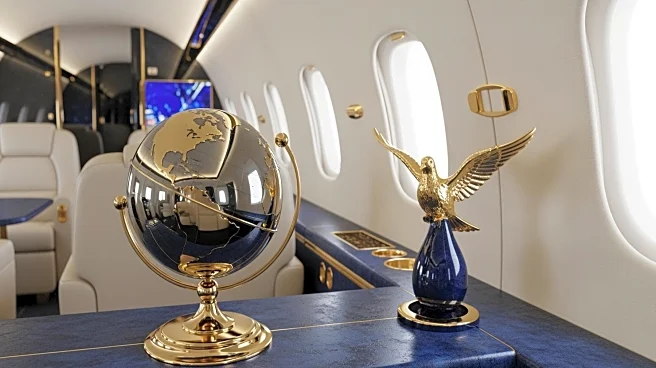What's Happening?
President Trump met with Qatar's Emir Sheikh Tamim bin Hamad Al Thani aboard Air Force One during a refueling stop at Al Udeid Air Base near Doha, Qatar. The meeting was part of Trump's journey to Asia, specifically Kuala Lumpur, for the ASEAN summit.
The discussion highlighted Qatar's significant role in shaping the Israel-Hamas peace deal, with Trump expressing gratitude for their contributions to Middle East stability. The Emir's visit was prompted by the refueling stop, and he expressed his eagerness to meet Trump, stating he wouldn't allow Air Force One to depart without greeting the President. Additionally, Qatar's royal family is donating a Boeing 747-8 luxury jumbo jet to serve temporarily as Air Force One, a gesture that has attracted scrutiny from some of Trump's supporters.
Why It's Important?
The meeting underscores the strategic partnership between the U.S. and Qatar in maintaining peace in the Middle East. Qatar's involvement in the Israel-Hamas peace deal highlights its influence in regional diplomacy. The donation of a luxury jet by Qatar's royal family signifies the deepening ties between the two nations, although it has raised concerns among some of Trump's supporters regarding the implications of such a gift. This development could impact U.S. foreign policy and diplomatic relations in the region, potentially influencing future peace negotiations and stability efforts.
What's Next?
President Trump's visit to Asia for the ASEAN summit may further involve discussions on regional security and economic cooperation. The ongoing collaboration with Qatar could lead to more strategic partnerships in the Middle East, focusing on peace and stability. The scrutiny over the luxury jet donation may prompt discussions on ethical considerations in diplomatic gifts and their influence on international relations. Stakeholders, including political leaders and civil society groups, may react to these developments, shaping future diplomatic engagements.
Beyond the Headlines
The donation of a luxury jet by Qatar's royal family raises ethical questions about the influence of wealth in diplomatic relations. It highlights the complexities of international diplomacy, where gifts can be perceived as gestures of goodwill or as attempts to sway political favor. This situation may prompt broader discussions on the transparency and regulation of diplomatic gifts, potentially leading to policy changes in how such exchanges are managed.
















